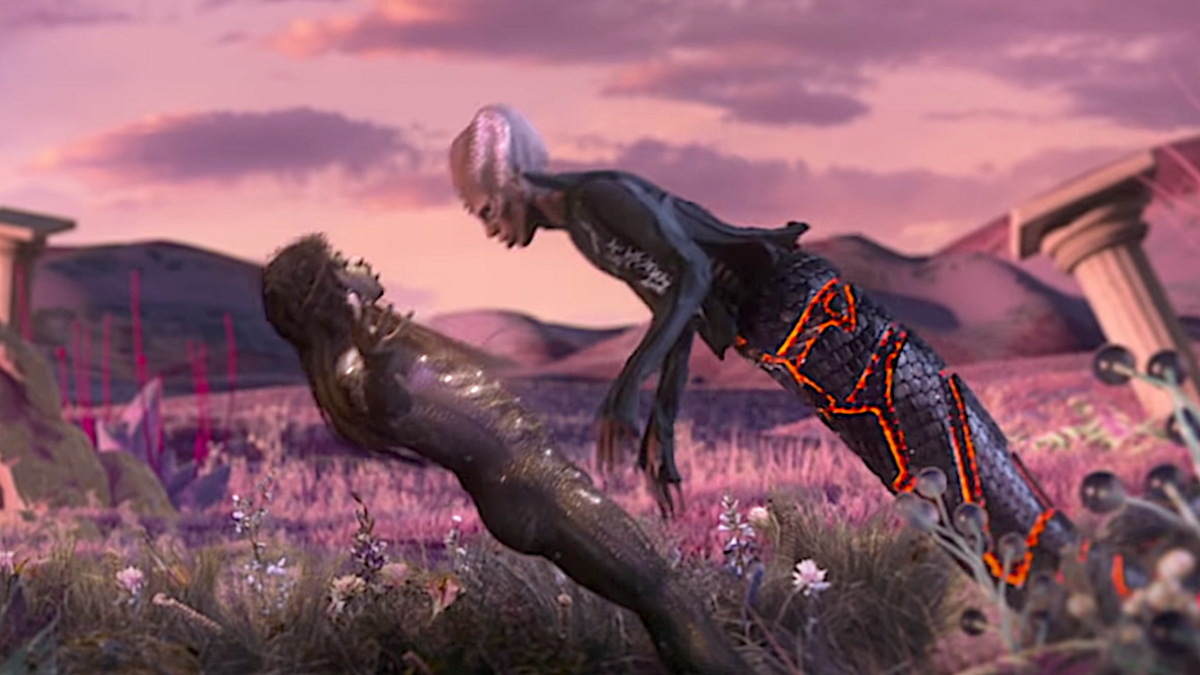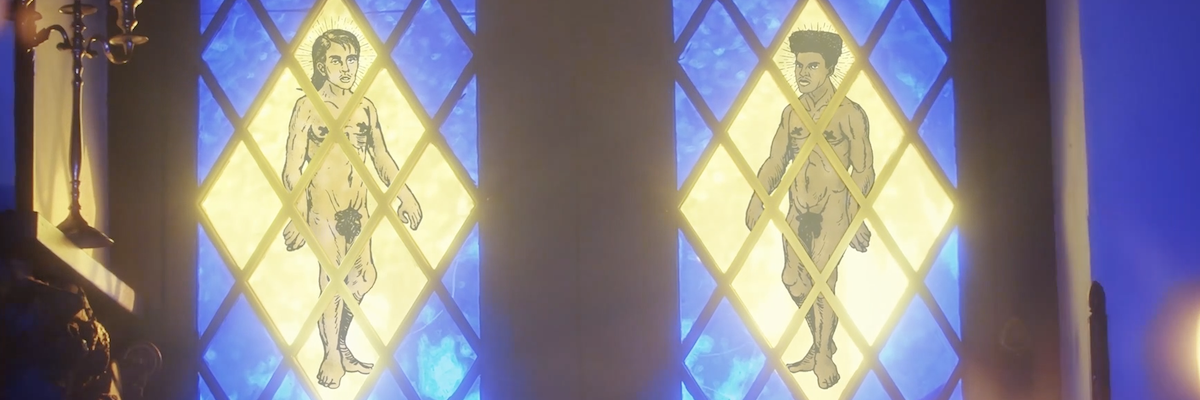
Adam and Steve: Queer artists repurpose Genesis as a gay love story
By “queering” Genesis with their music, Dorian Electra and Lil Nas X repurposed the Adam and Eve dynamic, turning it into a gay love story.
In the first sixty seconds of the music video for Lil Nas X’s “Montero,” a dense creative eroticism unfolds, brimming with color and intensity as Nas is pursued, then seduced by a hypnotic man-snake before a magnificent tree.
The imagery is biblical. The gay sex is new.
For Dorian Electra’s “Adam and Steve”, the symbolism is stained glass and angels, paired with even more homoerotic intensity.
Both Lil Nas X and Dorian Electra are leveraging the biblical story of Genesis to reclaim Christian ideology. For many queer adults, these stories were the frame around the religious trauma of childhood. Now they are reimagined and co-opted in the name of gay love.

To try to understand this phenomenon, I spoke to queer members of my community about the way gayness was introduced to them during their religious upbringing. In some cases, homosexuality was specifically mocked or condemned. But I also learned that it often wasn’t named or mentioned at all: rather, religious leaders would focus on the importance of gender roles for men and women. The superiority of heterosexuality was unstated but clearly implied.
Except when it was shouted loud and clear.
Allison, a lesbian who was raised Mormon, did note that talks from the General Conference (wherein leadership central to the Mormon church speak directly to its members) “specifically damned ‘Same Gender Attraction’ and assigning transgressions related to ‘SGA’ the same severity as premarital sex: tantamount to murder.” However, her earliest memory pertaining to homosexuality was of a framed copy of ‘The Family: a Proclamation to the World’ that hung in her childhood kitchen: “It danced around the subject, but made its point by saying things like ‘marriage between a man and woman is ordained by god’ or ‘gender is an essential characteristic of individual premortal, mortal and eternal identity and purpose.’”

Tabitha, a bisexual woman who was raised Pentecostal and is married to a woman (that would be me—Tabitha is my wife), noted that she didn’t experience trauma or discrimation for her queerness because she could still “pass” as a straight woman. “As long as I could fulfill my requirements as a woman, as a Pentecostal woman, it didn’t matter,” she explained.
In some cases, there was no need for religious leaders to explicitly punish or call out gayness: this job was outsourced to other children. Both Paul, who went to Catholic school, and Lilith, a bisexual trans woman who attended a Guatemalan Protestant church, were called “the F slur” by other kids (Paul, in a classroom–he was subsequently punished for giving the name-caller a “dirty look” in response; pre-transition Lilith, in Sunday school, because she sat on the girls’ section of the room when no seats were available on the boys’ side).
Homophobes love to use the phrase “It’s Adam and Eve, not Adam and Steve” to assert that the Bible condones only heterosexual relationships, and prohibits same-sex ones. But is the story of Adam and Eve really about relationships? My interviewees across denominations largely agreed: it’s a story about power, control, and gender hierarchy, and decidedly not a love story.
Let’s take this summary from Tabitha’s Pentecostal upbringing:
The way the story was taught is that Adam was the first human, he was made by God and he was given the Garden of Eden. He was given everything within it and told not to eat of one of the trees. Then Eve was made of his body, and he was given Eve to educate. Adam was to be Eve’s protector and Eve trusted Adam.
One day, the serpent offered Eve fruit from the tree Adam knew not to eat of, and—by all accounts—Adam was right there. And he also ate the fruit. What transpired was he immediately became the biggest pussy in the history of the world… It all fell on Eve’s shoulders.
Whenever I asked my grandfather the preacher about this, he constantly just told me I was a girl and it was just my job to listen to the men in my life and they’d explain it.
I don’t know how anyone gets a love story from Adam and Eve. It’s an abusive relationship from the opening scene of the bible.
This interpretation of the story isn’t unique to women. Paul, who was raised by his mother and sisters and says he was “always disgusted by the rib thing,” credits Genesis for making him a feminist from a young age. Lilith chose a name inspired by an alternative version of Genesis when she transitioned because, in her words, “I didn’t come from no one’s rib. No man can be in a higher position than me in social hierarchy because I am whole and valid as myself.”
Elaine, a bisexual woman raised Evangelical, was aware from a young age that the story “seemed to demonize you as a woman. They used it to make you hate yourself for not being as perfect as a man. There’d be nothing we could do to ever compare to man, so therefore we have to respect everything that ever came out of a man’s mouth. The message was, you all need to submit to us.”
By “queering” Genesis with their music, pop artists Dorian Electra and Lil Nas X repurposed the Adam and Eve dynamic, turning it into a love story that’s arguably much more romantic than the Biblical original.
In Lil Nas X’s “Montero” video, which begins in Eden, the romance is between the protagonist and the serpent. “If Eve ain’t in your garden,” he sings, noting that Eden wouldn’t be paradise for everyone as-is. There’s nothing inherently sinful about the serpent and protagonists’ sexuality in the video, but it still leads to the protagonist being stoned to death in Rome, then starting to ascend to heaven before being redirected to hell, where he dances for the devil.
Lil Nas X has referenced his religious trauma in other songs (in “Sun Goes Down,” he sings about how at a younger age he prayed to God to take his gayness from him) and in interviews. Raised to believe that homosexuality was unacceptable and that gay people were doomed to go to Hell, the video’s denouement reclaims this fate: if Gay people can’t live on Earth or ascend to Heaven, they’ll just be gay in Hell, thank you very much.

Dorian Electra’s “Adam & Steve” also subverts the idea that gay people are inherently damned by reimaging it without the hierarchical, toxic heterosexuality present in Genesis. As Tabitha mused, “Adam asks for a helpmate, and then Eve gets ripped from his body. They were never equally matched. Those were not helpers. That’s not equally yoked, or two matched people. From that idea, it SHOULD have been Adam and Steve!”
“Adam & Steve” explores this very concept: it frames the story as one of love, in which the two male protagonists begin as “equals”:
Made in his image,We were born two of a kind, beginning of time
Dorian Electra makes it clear that there is nothing sinful or shameful about this existence—Adam & Steve’s love is pure innocence, while homophobia is a sin introduced when they eat the fruit:
And in the garden, they were both thereSmiling like children, without a careAnd in the garden, up on the treeThey saw the fruit, for you and me And in the garden, they took a biteAshamed of the truth, ashamed of the lightCast into darknessThey would be damned for being a man holding hands
Like Lil Nas X embracing and dancing in Hell, this statement is a balm for queer people raised to feel like something was wrong with them.
“It lifted me out of a lot of shame,” Elaine said of the Dorian Electra song.
Lucio, a gay man who was raised Evangelical and struggled with his sexuality through his thirties, talked to me about the level of shame he experienced in his religious upbringing. His church brought in speakers to teach about homosexuality being a sin, and invited a “reformed” homosexual member of the church to speak about renouncing his homosexuality. The degree of fearmongering and shame was so intense than when, at the age of 12 or 13, a youth pastor detected something in Lucio and “laid hands on him” to “cast the demon of homosexuality” from him, Lucio didn’t even consider that this was an assault. “All I could think was that now everybody knew, and I’m going to hell,” he recalls. “If I ever act upon this it’s eternal damnation for me.”
[Adam & Steve] is a balm for queer people raised to feel like something was wrong with them.
“It lifted me out of a lot of shame,” Elaine said.
My interviewees spoke of lasting damage from homosexuality and gender role definitions in their religious upbringings, and this sense of being a mistake or being inherently “wrong”—for being queer, for dressing wrong or for not performing a gender role as the church defined it—lingered even as they attempted to unravel it as adults. Dorian Electra, who took a cautionary tale that insists on hierarchical gender roles and turned it into a tragic love story, repeats messages throughout “Adam & Steve” that insist on the opposite: that queer people are meant to be exactly the way they are.
God made me, and he loves me
Say I’m an abomination, but I’m God’s creation
God made me gay
I hope that one day, the people I spoke to in my community will all be able to fully believe this about themselves.
Queer religious trauma is only partly driven by actual, explicit homophobic rhetoric. At its core, what hurt kids raised with strict Christian beliefs were gender roles: the idea that as a boy or girl, they had to behave a certain way, and that romantic relationships would be inherently hierarchical, based on performing a societal role rather than on love and mutual respect.
From a non-Christian perspective, I’ve always thought of Christianity as a religion of love at its core. Seeing gay pop icons reframe Christian stories to turn them into loving narratives is a cathartic sort of irony.
